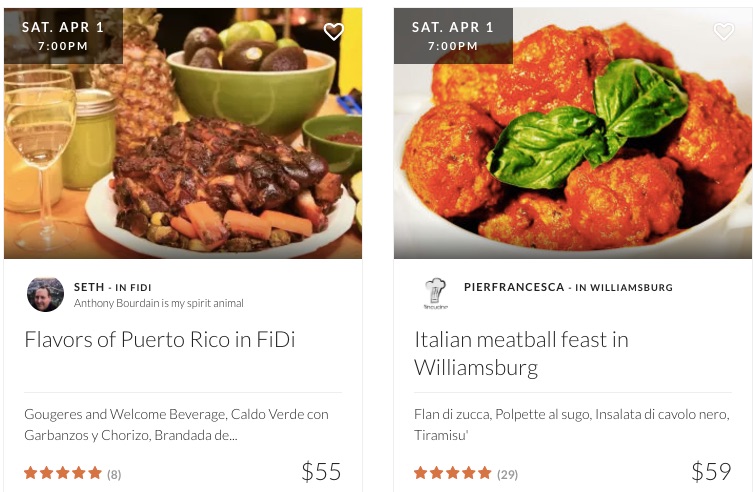Enjoying slow-cooked veal, roast potatoes, cheese and black pepper ravioli in asparagus and guacamole sauce, 14 diners ate a €25 lunch at Claudia Proietti’s home near Rome.
And that might be the problem.
Food Intermediaries
Home restaurants have become more popular. In Italy, the social-eating website Gnammo has a membership of 225,000. Similarly, the EWSAs (Eat With Strangers Apps) in the U.S. have been called the “Airbnbs of food.”
As economists we could call them dining intermediaries. Like the financial intermediaries that move money from savers to borrowers, dining intermediaries connect eaters and home chefs.
Reading about EatWith at eater.com, I took a look. The site said they had hosts in 200+ cities:
Looks good:

Our Bottom Line: Sharing Economy Dilemmas
One sociologist compares the onset of the sharing economy to economic changes at the beginning of the 20th century. Transitioning from small town businesses where transactions were guided by trust among people who knew one another to the growth of big corporations, our society needed new laws. Responding, we got more regulatory, licensing and tax legislation. Now again perhaps again we need to adjust to a reconfigured business model.
But how?
Some say the market system has the answers. It creates competition and pricing pressure. Just one bad meal and few people will return. Furthermore, licensing and regulatory red tape keep out newcomers (like women in male-dominated professions like chefs). It constrains innovation and protects the status quo.
But you know the other side. We also like guaranteeing that our food purveyors, our ride sharing and our rented rooms are clean and safe.
And that takes us back to where we began. Like Uber and Airbnb, EWSAs are challenging what has been called a political property rights. And like Uber and Airbnb, they too could wind up in (food) court.
My sources and more: Mouthwatering, the home chef meals described in the WSJ and eater.com articles demonstrate why “social-eating” is becoming more widespread. It also displays why they are getting the same reaction as Uber and Airbnb. Next though, if you want more of the sharing economy analysis, this hour long econtalk podcast is one of their best. But if you just want one issue, Wired takes us to trust.
Please note that several sentences from Our Bottom Line were previously published at econlife.






